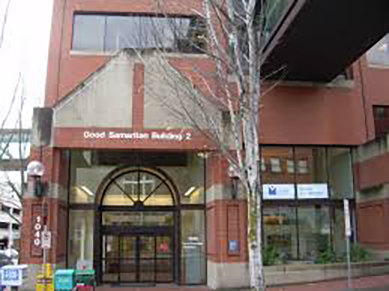BRAVO (done w/ our providers at Endo)
How does the Bravo esophageal pH test work?
A small capsule, about the size of a gel cap, is temporarily attached to the wall of the esophagus during an upper endoscopy. The capsule measures pH levels in the esophagus and transmits readings by radio telecommunications to a receiver (about the size of a pager) worn on your belt or waistband. The receiver has several buttons on it that you will press to record symptoms of GERD such as heartburn (the nurse will tell you what symptoms to record). You will be asked to maintain a diary to record certain events such as when you start and stop eating and drinking, when you lie down, and when you get back up. This will be explained by the nurse. You will have the recorder for 48 hours. The Bravo capsule will fall out on its own- no need to remove it.
How do I prepare for the Bravo esophageal pH test?
Let your physician know if you have a pacemaker or implantable heart defibrillator, a history of bleeding problems, dilated blood vessels, and any other previously known problems with your esophagus.
Seven days before the monitoring period, do not take proton pump inhibitors such as omeprazole (Prilosec®), lansoprazole (Prevacid®), rabeprazole (Aciphex®), pantoprazole (Protonix®), esomeprazole (Nexium®).
Two days (48 hours) before the monitoring period, do not take the H2 blockers ranitidine (Zantac®), cimetidine (Tagamet®), famotidine (Pepcid®), nizatidine (Axid®); or the promotility drug, metoclopramide (Reglan®).
Six hours before the monitoring period, do not take antacids (such as Alka-Seltzer®, Gaviscon®, Maalox®, Milk of Magnesia®, Mylanta®, Phillips®, Riopan®, Tums® or any other brands).
Nothing to eat or drink after midnight.
Please note: Occasionally, your doctor may want you to continue taking a certain medication during the monitoring period to determine if it is effective.
Once the test has begun, what do I need to know and do?
Activity: Follow your usual daily routine. Do not reduce or change your activities during the monitoring period. Doing so can make the monitoring results less useful. Note: Do not get the receiver wet; it is not waterproof!
Eating: Eat your regular meals at the usual times. If you do not eat during the monitoring period, your stomach will not produce acid as usual, and the test results will not be accurate. Eat at least 2 meals a day. Eat foods that tend to increase your symptoms (without making yourself miserable). Avoid snacking. Do not suck on hard candy or lozenges and do not chew gum during the monitoring period.
Lying down: Remain upright throughout the day. Do not lie down until you go to bed (unless napping or lying down during the day is part of your daily routine).
Medications: Continue to follow your doctor’s advice regarding medications to avoid during the monitoring period.
Recording symptoms: Press the appropriate button on the receiver when symptoms occur (as discussed with the nurse). Record the time you start and stop eating and drinking (anything other than plain water). Record the time you lie down (even if just resting) and when you get back up. The nurse will explain this.
Unusual symptoms or side effects: If you think you may be experiencing any unusual symptoms or side effects, call your doctor.
You will return the receiver and diary when the monitoring period is over- 48 hours. The information on the receiver and diary will be downloaded to a computer and the results will be analyzed. Preliminary study data will be reviewed with you if you desire.
After completion of the study:
Resume your normal diet and medications.
Your doctor will discuss the results of your test with you during your next scheduled appointment.
Normal activities – such as swallowing, eating and drinking – will cause the disposable pH capsule to detach and pass through the digestive tract in 7 to 10 days on average.
No MRI exams (magnetic resonance imaging) should be performed for 30 days following capsule insertion.
EGD (endoscopy)– “like a colonoscopy for your stomach” (done w/ our providers at Endo)
“The scope” EGD is an endoscopic procedure that allows your doctor to examine your esophagus, stomach and duodenum (part of your small intestine).
EGD is a small lighted flexible tube/scope that goes down your throat through your mouth into the esophagus and stomach and into the small intestine to look for abnormalities.
EGD is an outpatient procedure, meaning you can go home that same day. It takes approximately 30 to 60 minutes to perform. Endoscope
Food & Drink: Nothing to eat or drink after midnight the night before your procedure.
Avoid anti-inflammatories (ibuprofen, Motrin, Advil, Aleve, or naproxen) and aspirin and any medications containing these medications 1 week before your procedure.
If you are Diabetic, do not take any of your medications the day of your procedure. Take your regular diabetic medications the day before as usual, but not the day of the procedure. If you are on insulin you should only take half of your regular dose the day before your procedure.
Do not take any medications the day of your procedure except you CAN take chronic pain and/or anxiety medications on the day of your procedure if needed.
If you are taking a beta blocker and/or an antacid, you should take those in the morning of the procedure with a small sip of water as soon as you wake up in the morning.
Discharge: At the time of your discharge you will need someone to pick you up at the hospital and drive you home. You will not be allowed to drive yourself.
EGD w/ dilation
Procedure that allows your doctor to dilate, or stretch, a narrowed area of your esophagus- swallowing tube. Can make it easier or help with swallowing.
Gastric Emptying (done w/ imaging)
A gastric emptying study is a diagnostic imaging exam that measures the time it takes for food to empty from the stomach and enter the small intestine. A Gastric Emptying Study is a test to determine the time it takes a meal to move through a person’s stomach.
It involves eating a light meal, such as eggs and toast, that contains a small amount of radioactive material.
Manometry (done w/ our providers in Endo)
Esophageal manometry is a test to measure the strength and function of the esophagus (the “food pipe”). Results can help identify causes of heartburn, swallowing problems, or chest pain. The test can also help plan surgery and determine the success of previous surgery.
During the test
Manometry takes about an hour. Usually you lie down during the test. Your nose and throat are numbed. Then a soft, thin tube is placed through the nose and down the esophagus. At first you may notice a gagging feeling. You will be asked to swallow several times. Holes along the tube measure the pressure while you swallow. Measurements are printed out as tracings, much like a heart test tracing. After the test, another catheter may be left in the esophagus for up to 24 hours to measure acid (pH) levels.
After esophageal manometry
You’ll probably discuss the results of the test with your healthcare provider at another appointment. This is because time is needed to review the tracings. You may have a mild sore throat for a short time. As soon as the numbness in your throat is gone, you can return to eating and your normal activities.
RUQ US (done w/ imaging)
Ultrasound is a type of imaging. It uses high-frequency sound waves to look at organs and structures inside the body.
SmartPill (done at our office)
SmartPill is a single-use capsule that you swallow which travels through your GI tract and wirelessly transmits data about your GI tract to a recorder worn on a belt clip or pouch. The data collected allows your physician to thoroughly evaluate the transit time of your entire GI tract without using radiation. Ingestion of the capsule does not require sedation, thus after swallowing; you are able to resume most of your normal daily activities while test data is collected.
Prior to the Exam
Discontinue all of the following medications:
7 days prior to appointment date/ time: Stop taking PPI’s
Aciphex (Rabeprazole), Dexilant (Dexlansoprazole), Nexium (Esomeprazole), Prevacid (Lansoprazole) Prilosec (Omeprazole), Protonix (Pantoprazole), Zegrid
48 hours prior to appointment time: Stop taking H2 Blockers
Axid (Nizatidine), Pepcid (Famotidine), Tagamet (Cimetidine), Zantac (Ranitidine)
48 hours prior to appointment time: Stop taking Motility Agents
Benzamide, Cinitapride, Cisapride, Domperidone, Erythromycin, Itopride, Levosulpiride, Mosapride, Metoclopramide, Mirtazapine, Mitemcinal, Prucalopride, Renzapride, Tegaserod
24 hours prior to appointment time: Stop taking Antacids
Alka-Seltzer, Alka-2, Alternagel, Amphojel, Gaviscon, Gelusil, Maalox, Milk of Magnesia Mylanta, Pepto-Bismol, Rolaids, Surpass Gum, Titralac, TUMS
Refrain from alcohol consumption 24 hours prior to appointment time.
Refrain from smoking during your fasting period.
IMPORTANT: You must fast overnight before your appointment. Please do not eat or drink anything after 12 midnight. Nothing at all to eat or drink the morning of the exam.
Diabetic Patients:
Do not take oral diabetic medication (pills) the day of the appointment
If insulin is used at bedtime, take half of your usual dose.
If insulin is used twice a day, take half of your morning dose on the day of the exam.
Food Allergies: You will be given a SmartBar granola bar to eat for breakfast before capsule ingestion. The SmartBar contains a small amount of Gluten. It does not contain Lactose. Although it does not contain nuts, it is manufactured in a facility that processes nuts. Please inform the staff prior to your test date if you have any allergies to any of these ingredients
Upper GI Endoscopy- Barium Swallow (video of swallowing)/ Fluoro Esophagus done w/ imaging
An upper gastrointestinal (GI) series is an X-ray exam of your upper digestive tract, the area from your mouth to the start of your small intestine. This test uses fluoroscopy, a type of real time X-ray that can show organs in motion. This test helps your doctor find problems such as ulcers, tumors, and certain diseases.
For the upper GI series, you will be asked to swallow a liquid barium mixture (sometimes called a “barium meal”). The radiologist uses a fluoroscope to watch the barium as it travels down your esophagus and into the stomach. You’ll be asked to move into various positions on the Xray table while the radiologist watches the GI tract, permanent pictures – xray films will be made as needed.
How do I get ready for an upper GI series?
Follow any directions you are given for not eating or drinking before your test.
Be sure to mention the medicines you take and ask if it’s OK to take them before your test.
Do not smoke the morning of the test.
The test usually takes about 30 minutes. Allow extra time to check in.
Tell the technologist if:
You have any allergies
You ate or drank within the last 8 hours
You’re pregnant or think you may be
You’ve had any previous surgery
You take any medicines
What happens during an upper GI series?
You will drink barium (a liquid that improves X-ray images).
You also may swallow “fizzies,” a substance that makes air build up in your stomach. Don’t burp, even if you feel you have to.
You may need to stand or lie in different positions or have your exam table tilted in various directions.
You will be asked to hold your breath for a short time during the X-ray.
What happens after an upper GI series?
Your stool may appear white or lighter than normal.
You may have constipation caused by the barium. You can relieve this by taking an over-the-counter laxative or stool softener and drinking lots of fluids for several days after the exam. Talk with your healthcare provider if you have serious bowel movement problems after the test.
Your doctor will discuss the test results with you during a follow-up appointment or over the phone

